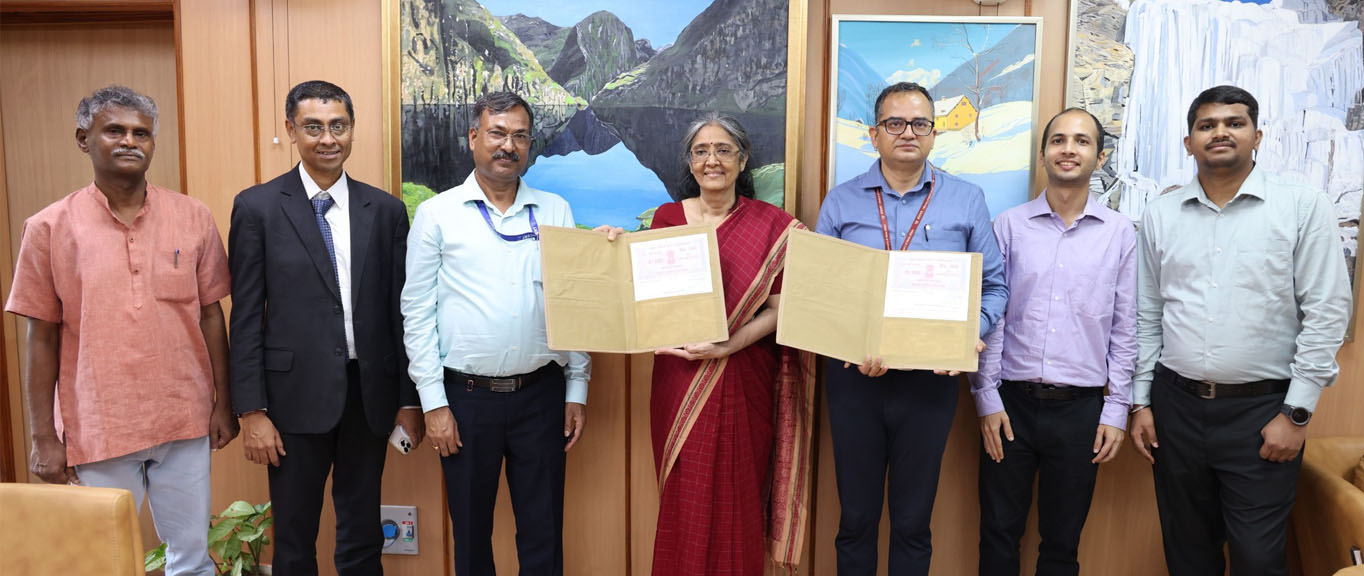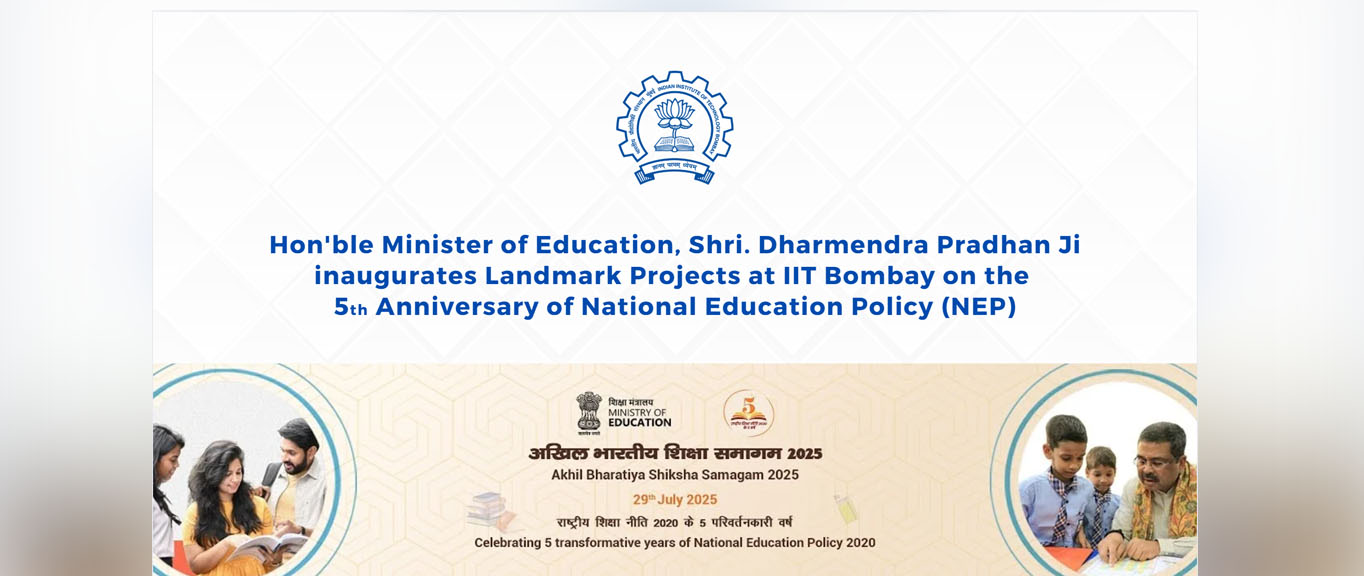Union Education Minister Inaugurates Project Evergreen, New DSSE Building, and TARA App
The Hon’ble Shri Dharmendra Pradhan, Union Education Minister, inaugurated the Akhil Bharatiya Shiksha Samagam (ABSS) 2025 in New Delhi to commemorate 5 years of NEP (National Education Policy) 2020. ABSS 2025 marked the fifth anniversary of NEP 2020, serving as a platform for academicians, policymakers, educators, industry leaders, and government representatives to review the remarkable progress made under NEP 2020 and chart the way forward.
The Minister of State for Education & Minister of State (IC), Ministry of Skill Development & Entrepreneurship, Shri Jayant Chaudhary; Minister of State for Education & Development of North Eastern Region, Dr. Sukanta Majumdar; and Education Ministers from 13 States/UTs also graced the occasion.
Speaking on the occasion, Shri Pradhan extended his heartfelt wishes on the successful completion of five years of the National Education Policy (NEP) 2020. He stated that NEP 2020 reflects the transformative vision of Prime Minister. the Hon’ble Shri Narendra Modi, who places education at the heart of India’s growth story.
He further remarked that as the nation moves towards the vision of “Viksit Bharat 2047,” NEP 2020 serves as a national mission guiding the way forward. He highlighted that over the past five years, the government has succeeded in taking NEP 2020 from policy to practice, bringing about a paradigm shift in the education system and reaching classrooms, campuses, and communities.
On this momentous occasion, Shri Pradhan also inaugurated landmark projects at IIT Bombay, including Project Evergreen, the new Desai Sethi School of Entrepreneurship (DSSE) building, and the TARA app, virtually.
This significant event reflects the Institute’s ongoing efforts to transform its higher education landscape through innovation, inclusion, and investment in infrastructure, central themes of the NEP 2020. Shri Pradhan’s address underscored how these projects contribute meaningfully to building a holistic, future-ready academic ecosystem, aligned with the national vision of a knowledge-driven and Aatmanirbhar Bharat.
“We are thankful to the Honourable Union Minister of Education for inaugurating our key projects. It will boost our efforts,” said Prof. Shireesh Kedare, Director, IIT Bombay.
Multiple Projects, One Vision: Innovation, Inclusion, Infrastructure
The inauguration of Project Evergreen, the DSSE Building, and the launch of the TARA app exemplify the Institute’s long-term commitment to fostering a vibrant academic and research ecosystem while empowering future leaders in science, technology, and entrepreneurship.
Project Evergreen: Alumni Powering a New Era in Student Living
Few initiatives in IIT Bombay’s history have reflected the power of alumni collaboration quite like Project Evergreen—a landmark effort that brings together vision, generosity, and a deep commitment to the student experience. This alumni-led, alumni-built, and alumni-delivered world-class hostel endeavour has resulted in the creation of three state-of-the-art hostels (H7, H8, and H21), adding 848 rooms and 1,127 beds, and offering students vibrant, thoughtfully designed spaces to live better, learn better, debate, dream, and build friendships that last a lifetime.
Over 30 batches of alumni have come forward over the years to support Project Evergreen, making it one of the most far-reaching and unifying alumni initiatives in the Institute’s history.
Empowering Women in STEM: Coal India’s Pivotal Contribution
As part of IIT Bombay’s growing focus on inclusive campus infrastructure, Coal India Limited has played a significant role in strengthening housing for women students. Through a significant contribution, Coal India Limited enabled the creation of Hostel 21 (part of Project Evergreen), a dedicated women’s hostel that now accommodates 370 girl students.
“Coal India Limited is proud to support the construction of the new women’s hostel at IIT Bombay as part of our commitment to education and gender empowerment under CSR. This collaboration with one of India’s premier institutions reflects our belief that quality infrastructure plays a crucial role in nurturing future leaders. As we celebrate CIL’s Golden Jubilee, we are honoured to contribute to a project that will benefit generations of young women pursuing excellence in science and technology,” said Dr. Vinay Ranjan, Director (HR), Coal India.
This contribution reflects how purpose-driven CSR from public sector enterprises can complement institutional efforts and deliver national impact.
New DSSE Building: Empowering Student Entrepreneurs
The newly inaugurated Desai Sethi School of Entrepreneurship (DSSE) building is designed to be a launchpad for student innovation and enterprise. With collaborative workspaces, labs, and incubation facilities spanning across 1,15,000 sq. ft, the facility supports students and researchers to develop solutions with real-world impact, reflecting NEP 2020’s call to nurture job creators, thanks to the generous support of the Institute’s distinguished alumnus and philanthropist, Mr. Bharat Desai, and Ms. Neerja Sethi.
DSSE, as a pioneering entrepreneurship school, has been training aspiring entrepreneurs through academic and pre-incubation programmes and building the talent pipeline for the nation. Since its inception, DSSE’s entrepreneurship courses have benefited more than 4,750 students. Over 1120 students have been mentored by the faculty and alumni, close to 430 venture teams formed, and over 109 startups registered by DSSE students.
This investment in deep-tech infrastructure aligns with India’s aspirations to lead in frontier research and global innovation, key themes in the NEP 2020 framework.
“The Desai Sethi School of Entrepreneurship reflects the spirit of India’s National Education Policy — empowering students to think boldly, take risks, and translate ideas into impact. With its world-class ecosystem, IIT Bombay is uniquely positioned to shape the next generation of innovators and job creators. Our hope is that this building becomes a vibrant hub where students, mentors, researchers, and industry leaders come together to move ideas from lab to market, and from inspiration to enterprise,” said Mr. Bharat Desai.
Launch of the TARA App

Shri Pradhan also launched IIT Bombay’s Oral Reading Fluency (ORF) testing app TARA (Teacher’s Assistant for Reading Assessment) developed by Prof. Preeti Rao, Department of Electrical Engineering, and her team. TARA, a patented technology, uses audio signal analyses to measure attributes linked to word decoding accuracy, pace, and expression for oral reading fluency (ORF) testing. The reading fluency measures are consistent with the foundational literacy competencies specified by the NIPUN Bharat Mission. The objective evaluation based on standard rubrics is facilitated by a voice-based AI trained on expert-annotated audio recordings of children across skill levels and reading level-appropriate texts. The research project received financial and technical support from the Tata Centre for Technology and Design (TCTD), IIT Bombay, and the Abdul Kalam Technology Innovation National Fellowship (2020-2025).
NCERT and IIT Bombay have signed an MoU to implement and deploy a reliable and scalable digital solution for the assessment of ORF, a critical component of foundational literacy, for English and regional Indian languages. The MoU was signed by Prof. Shireesh Kedare, Director, IIT Bombay, and Mr. Aman Sharma, Secretary, NCERT. The year-long assessment exercises will be carried out in the target population (state, schools, grades) with suitable levelled text passages in the language(s) of choice. A dashboard will provide real-time data at multiple levels on reading proficiencies across the cohort. A report card will be available for each child at the end of the testing phase, providing the child’s scores on accuracy, pace, words correct per minute (WCPM), and expression, together with feedback on the errors in word decoding and prosody. The feedback will also be connected to curricular learning outcomes to help teachers observe and systematically track learning, while potentially responding to learners’ needs continually.
A Model for Nation-Building through Collaboration
These projects demonstrate the powerful synergy between government vision, alumni generosity, institutional ambition, and corporate partnership. As India marks five years of NEP implementation, IIT Bombay stands as a model for how these forces can come together to create inclusive, innovation-ready institutions.

